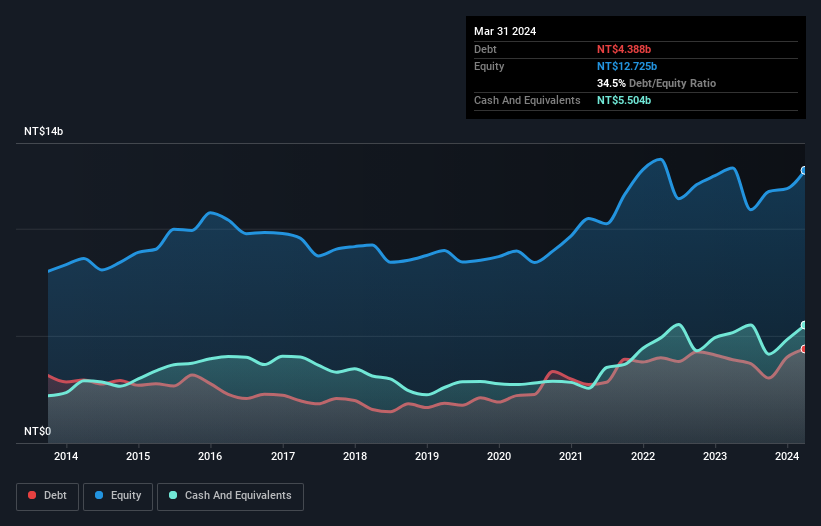- Taiwan
- /
- Electronic Equipment and Components
- /
- TWSE:3042
We Think TXC (TWSE:3042) Can Stay On Top Of Its Debt
Howard Marks put it nicely when he said that, rather than worrying about share price volatility, 'The possibility of permanent loss is the risk I worry about... and every practical investor I know worries about.' So it seems the smart money knows that debt - which is usually involved in bankruptcies - is a very important factor, when you assess how risky a company is. We note that TXC Corporation (TWSE:3042) does have debt on its balance sheet. But is this debt a concern to shareholders?
Why Does Debt Bring Risk?
Debt assists a business until the business has trouble paying it off, either with new capital or with free cash flow. Part and parcel of capitalism is the process of 'creative destruction' where failed businesses are mercilessly liquidated by their bankers. However, a more frequent (but still costly) occurrence is where a company must issue shares at bargain-basement prices, permanently diluting shareholders, just to shore up its balance sheet. Having said that, the most common situation is where a company manages its debt reasonably well - and to its own advantage. When we think about a company's use of debt, we first look at cash and debt together.
Check out our latest analysis for TXC
What Is TXC's Net Debt?
As you can see below, at the end of March 2024, TXC had NT$4.39b of debt, up from NT$3.88b a year ago. Click the image for more detail. However, its balance sheet shows it holds NT$5.50b in cash, so it actually has NT$1.12b net cash.

A Look At TXC's Liabilities
According to the last reported balance sheet, TXC had liabilities of NT$4.27b due within 12 months, and liabilities of NT$2.80b due beyond 12 months. Offsetting this, it had NT$5.50b in cash and NT$3.05b in receivables that were due within 12 months. So it actually has NT$1.48b more liquid assets than total liabilities.
This short term liquidity is a sign that TXC could probably pay off its debt with ease, as its balance sheet is far from stretched. Succinctly put, TXC boasts net cash, so it's fair to say it does not have a heavy debt load!
It is just as well that TXC's load is not too heavy, because its EBIT was down 20% over the last year. When it comes to paying off debt, falling earnings are no more useful than sugary sodas are for your health. The balance sheet is clearly the area to focus on when you are analysing debt. But it is future earnings, more than anything, that will determine TXC's ability to maintain a healthy balance sheet going forward. So if you want to see what the professionals think, you might find this free report on analyst profit forecasts to be interesting.
Finally, a business needs free cash flow to pay off debt; accounting profits just don't cut it. While TXC has net cash on its balance sheet, it's still worth taking a look at its ability to convert earnings before interest and tax (EBIT) to free cash flow, to help us understand how quickly it is building (or eroding) that cash balance. Over the most recent three years, TXC recorded free cash flow worth 74% of its EBIT, which is around normal, given free cash flow excludes interest and tax. This free cash flow puts the company in a good position to pay down debt, when appropriate.
Summing Up
While it is always sensible to investigate a company's debt, in this case TXC has NT$1.12b in net cash and a decent-looking balance sheet. The cherry on top was that in converted 74% of that EBIT to free cash flow, bringing in NT$1.7b. So we don't have any problem with TXC's use of debt. The balance sheet is clearly the area to focus on when you are analysing debt. However, not all investment risk resides within the balance sheet - far from it. For example - TXC has 1 warning sign we think you should be aware of.
Of course, if you're the type of investor who prefers buying stocks without the burden of debt, then don't hesitate to discover our exclusive list of net cash growth stocks, today.
Valuation is complex, but we're here to simplify it.
Discover if TXC might be undervalued or overvalued with our detailed analysis, featuring fair value estimates, potential risks, dividends, insider trades, and its financial condition.
Access Free AnalysisHave feedback on this article? Concerned about the content? Get in touch with us directly. Alternatively, email editorial-team (at) simplywallst.com.
This article by Simply Wall St is general in nature. We provide commentary based on historical data and analyst forecasts only using an unbiased methodology and our articles are not intended to be financial advice. It does not constitute a recommendation to buy or sell any stock, and does not take account of your objectives, or your financial situation. We aim to bring you long-term focused analysis driven by fundamental data. Note that our analysis may not factor in the latest price-sensitive company announcements or qualitative material. Simply Wall St has no position in any stocks mentioned.
Have feedback on this article? Concerned about the content? Get in touch with us directly. Alternatively, email editorial-team@simplywallst.com
About TWSE:3042
TXC
Engages in the research, design, development, production, and sale of crystal units and oscillator products in Taiwan and internationally.
Flawless balance sheet and undervalued.
Similar Companies
Market Insights
Community Narratives




